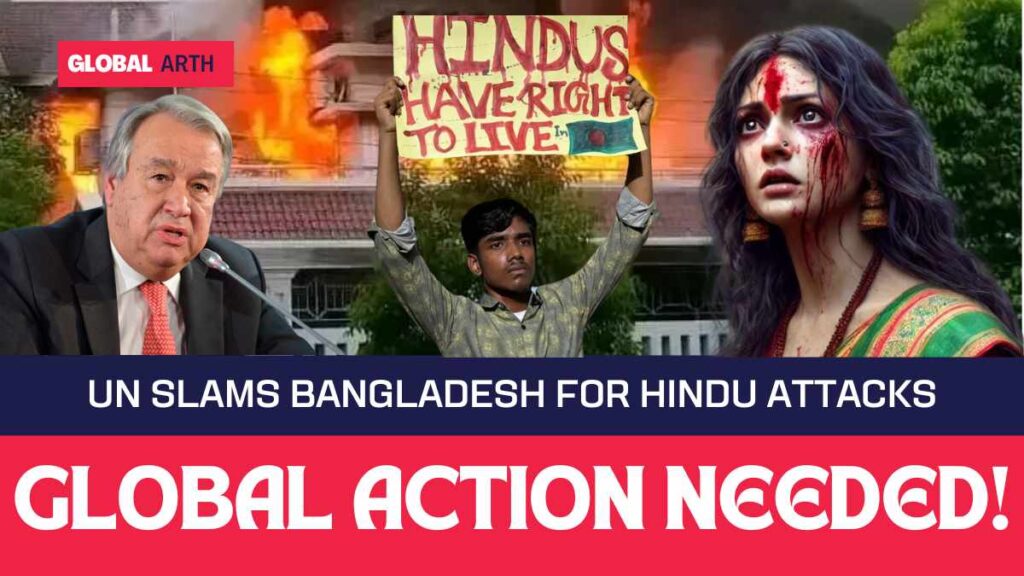UN Condemnation Sparks Global Awareness of Bangladesh Hindu Attacks
The United Nations has strongly condemned the recent surge in attacks on the Hindu community in Bangladesh, drawing significant international attention to the crisis. This condemnation underscores the urgent need for global intervention to protect minority rights and ensure the safety of vulnerable communities. As protests erupt in Dhaka, the spotlight is on Bangladesh’s government to address the violence and restore peace.

Protesters in Dhaka demand international intervention as UN condemns attacks on Hindus.
The United Nations has issued a strong condemnation of the escalating of the Bangladesh Hindu attacks, bringing much-needed international awareness to this pressing issue. The violence against Hindus has intensified in recent months, drawing the attention of global leaders and human rights organizations. This condemnation marks a pivotal moment, as it underscores the urgent need for international intervention to protect the rights and safety of minority communities in Bangladesh.
The UN’s statement has amplified calls for action, as protests erupt in Dhaka, the capital of Bangladesh, with demonstrators demanding an end to the persecution. Holding placards and chanting slogans, the protesters are urging the government and international community to ensure their safety and security. This development comes after years of relative silence from the international community, highlighting the significance of the UN’s involvement in addressing the crisis.
International Response and Diplomatic Efforts
The UN’s condemnation has spurred a wave of international response, with countries and organizations expressing solidarity with Bangladesh’s Hindu minority. The global spotlight on this issue has been a result of concerted diplomatic efforts, including those by the Israeli ambassador to India and Indian Prime Minister Narendra Modi, who have been vocal about the attacks on international platforms.
This growing international awareness is crucial in exerting pressure on the Bangladeshi government to take decisive action to protect its minority communities. The involvement of the UN has opened the door for further diplomatic engagement, encouraging countries to advocate for human rights and justice for the affected communities in Bangladesh.
Protests and Calls for Justice in Bangladesh Hindu Attacks
In Bangladesh, the Hindu community is actively protesting against the violence, asserting their right to live safely in their own country. Demonstrators in Dhaka have been holding rallies and vigils, demanding justice and urging the government to take immediate measures to prevent further attacks.
These protests have brought attention to the dire situation faced by the Hindu minority, who are often targeted during times of political unrest. The community has expressed a strong desire to remain in Bangladesh, rejecting calls to seek safety in neighboring countries. This sentiment is echoed by many who view Bangladesh as their homeland and are committed to staying despite the challenges.
Implications for Regional Stability
The violence against Hindus in Bangladesh has broader implications for regional stability, particularly for India. The threat of a refugee crisis looms large, with thousands of Bangladeshi Hindus attempting to cross into India for safety. This situation poses a complex challenge for India, which is already grappling with overpopulation and resource constraints.
The potential influx of refugees highlights the urgent need for a sustainable solution to the crisis. The UN’s involvement and the international attention it brings are crucial in addressing the root causes of the violence and ensuring long-term stability in the region.
Economic and Political Impact
The Bangladesh Hindu Attacks have significant economic and political repercussions. Trade between India and Bangladesh, once thriving, is now at a standstill due to the unrest. The uncertainty surrounding Bangladesh’s political future and its impact on economic policies add to the challenges faced by both countries.
The international community’s focus on this issue is essential in encouraging the Bangladeshi government to prioritize the safety and rights of its minority communities. By fostering dialogue and cooperation, there is hope for a peaceful resolution to the crisis and a restoration of normalcy in the region.
Rising Tensions and Political Demands
Amidst the violence, tensions have further escalated with protesters giving an ultimatum to Bangladesh’s Chief Justice Obaidul Hassan to resign within an hour. They have threatened to besiege his residence if he fails to comply. Radicals have ordered the Chief Justice to immediately stop the full court meeting, and Asif Mahmud, the adviser of the Youth and Sports Ministry of the interim government, has also demanded his unconditional resignation.

These demands add another layer of complexity to the situation, highlighting the volatile political climate in Bangladesh. The pressure on the government to address the underlying issues contributing to the unrest is intensifying, underscoring the need for urgent action.
The UN’s condemnation of the attacks on Bangladesh’s Hindu community is a significant step toward raising international awareness and prompting action. The global focus on this issue is crucial in ensuring the protection of minority rights and fostering regional stability.
As the world watches, there is hope that continued diplomatic efforts and international pressure will lead to a resolution, bringing peace and security to Bangladesh’s Hindu community and the region as a whole.
Share your thoughts in the comments below and engage with us on social media. Like our Facebook page, follow us on Twitter, and join our WhatsApp group for the latest updates and notifications.




